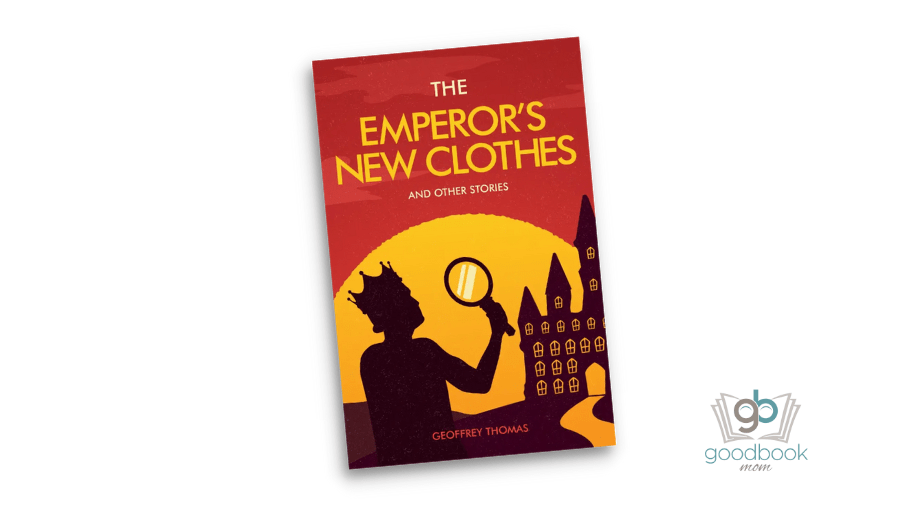
Summary
Each of these four books takes well-known tales and retells them in short story form. Some stories have also been slightly adjusted to have Christian themes and ideas woven throughout. After most of the stories, there are Gospel-centered reflections as well. Each book tackles a certain group of stories:
The Boy Who Shouted “Wolf!”– Aesop’s Fables
The Emperor’s New Clothes– Hans Christian Anderson Fairy Tales
The Legendary Casey Jones– American Folktales
The Pied Piper of Hamelin– Brother’s Grimm Fairy Tales
Reading Level: Ages 9-12
Read Aloud Age: Each short story is a bit different, see Mom Thoughts
As a helpful guide, I have listed each short story and its central theme. (This is not in the books themselves, but it would be a nice addition to later editions.)
The Boy Who Shouted “Wolf!”
Belling the Cat– Christ makes us clean of sin
The Boy Who Shouted “Wolf!” But There Wasn’t a Wolf– truthful speech
Androcles and the Lion– We don’t have to fear if we are God’s child
The Donkey and the Dachshund– Don’t compare your situation to others
The Cowardly Bat– You cannot serve two masters
The Battle Between the Sun and the East Wind– Beware of Flattery
To Live as a Swan or a Peacock You Must be Born as a Swan or a Peacock– You must be born again
The Last Days on the Old Lion– Salvation comes from God alone
The Donkey and the Statue– Obey your master
The Bundle of Sticks– The Gospel
The Emperor’s New Clothes
The Ugly Duckling– Lonlieness
The Adventures of Stag Bettle– Serving, not being served
The Little Boy Who Shot the Old Poet– Proper view of romantic love
The Nightingale– Jesus gives us rest
The Two Fir Trees– Only Christ can change you
The Golden Swan– Promises from Christ
The Storks– Love your enemies
Five Peas in a Pod– The Sovereignty of God
The Mysterious Canary– Not assuming about others
The Emperor’s New Clothes– Trust Christ alone, no substitutes
The Legendary Casey Jones
Beware of the Words, Smiles, and Frowns of Men– Warning about liars, persuasion with emotion, and legalism
Brer Fox, Brer Rabbit and the Two Failures- Love your enemies
The Battle of the Braggarts– Christ’s humility
Jonathan Chapman, or as he was Better Known, Johnny Appleseed– Learning from Johnny’s error
How a Pedlar Learned About the Final Price Being Paid- We can offer God nothing
The Hunted Goose– God is a just judge
The Legendary Casey Jones– Laying down your life for your friends
Fire, Fire, Fire!– The Holy Spirit
The Remarkable Story of Pocahontas– Reaching Natives with the Gospel
The Robin and the Bear– We are not too small to make a difference
The Pied Piper of Hamelin
The Princess and the Mattresses– Salvations makes us aware of sin
The Wolf and the Seven Kids– False teachers
Cinderella– Godly love
The Twelve Brothers– Human dignity
The Pied Piper of Hamelin– Keep your word
Pots of Caviar and Gold– Kindness
Little Red Riding Hood– Lessons for Christian living
Bigger and Better?– We cannot give God anything
Old Sultan– The Lord protects His people
The Fisherman and His Wife– Godly contentment
Mom Thoughts
If you have ever read a fairy tale or fable with your child and then talked about how the theme or events can relate to something in the Christian life, this is the series for you. Each short story is quite brief, with only a few being over 10 pages in length. These could be a fantastic option for a read-aloud, however, many of the fairy tales retain their dark themes. If you’ve read The Brothers Grimm and Hans Christian Anderson’s fairy tales before, this will not come as a surprise.
Most of the stories also have a reflection written by the author afterward, and it’s clear the author’s heart is to point young people to Christ and the Gospel.
“The apostle Paul writes, “Do not repay anyone evil for evil…If your enemy is hungry, feed him. If he is thirsty, give him something to drink…Do not be conquered by evil, but conquer evil with good” (Romans 12:17-21). That is how Jesus Christ lived and died. When he was nailed to the cross he did not shout at the soldiers or the Jewish rulers who plotted to kill him. In fact, the Lord said, “Father, forgive them, because they do not know what they are doing” (Luke 23:34). That is how we are to behave. If there is someone you know who makes your life a misery, pray for them. Perhaps God will use your prayers and one day they will hear the gospel message and believe.”
I can see this used well when addressing a certain topic or problem with a child as another avenue to have a conversation about that topic. To aid in that, I have written out what I see as the primary theme for each story in the Summary section. If you are looking for just one of the titles to try, I suggest The Boy Who Shouted “Wolf!” which retells Aesop’s Fables. This volume is not only the shortest but has the most stories that can be read aloud to younger children.
I have grouped the rest of my thoughts by book to help paint the most helpful picture for each individual volume.
The Boy Who Shouted “Wolf!”
There is one line that sounds as if it’s alluding to believers being able to lose their salvation, although I honestly do not think that was the author’s intent, I think it was just poorly worded to show children how those who seem to profess Christ might walk away. “Remember the power of flattery to change us because if not we may lose our trust in Jesus Christ.”
In speaking of Christ’s example of servant leadership, the author says that Jesus was teaching his disciples that their lives were all about themselves, but “about loving other people just as much as you love yourself.” This is perhaps being picky, but I would argue that verses like Philippians 2:3-4 teach we should actually love others more than we love ourselves.
Echoing sentiments from Romans 8:34 and Hebrews 7:25, but in his own words, the author states that “Jesus prays for his people to be saved and protected.”
A few times the phrase “receiving Christ as your Lord” is used. Although John 1:12 does say that those who “receive him, to them he gave the right to become children of God…” I know some families try to avoid using this phraseology because of how cultural Christianity has distorted the proper usage.
In addition to emphasizing the importance of truthful speech, I love that the title story of this book also addresses false teachers. “Not everyone who tells you the way to get to heaven speaks the truth. Jesus said, ‘I am the way, the truth, and the life’ (John 14:6). Always listen to the Lord Jesus. You can trust the warnings and promises that he makes. Safety and joy are found when we believe his words and trust in him.”
The Emperor’s New Clothes
In this version of The Ugly Duckling, there is a father duck who is rude and unkind to the Ugly Duckling, saying things like he is, “the ugliest duckling I have ever seen.” He also “despised” the little bird and made fun of him.
In an effort to show children that if you truly put your trust in Christ, he will never leave you nor forsake you- even though you will still sin- the author words this oddly: “And even if we are only very new Christians- in fact, even if we are not very good Christians…”
Although the author’s intent was to show that God provides all we need and every good gift is from him, a child might need some clarity that God doesn’t always provide the most luxurious food or the most expensive clothes, because he gives us what we need, not what we want. “The Lord Jesus also promises that he will give us all that we need. But best of all, he doesn’t do it reluctantly, or grudgingly, but he does it abundantly. Think of big ice creams and large bowls of Eton Mess and all your favorite food, the softest bed, your favorite music, the nicest clothes, all the people you love being with you…well, did you know that it is the Lord Jesus that gives you all those things? But more than that, he also gives us all that we need spiritually.” Again, I don’t believe the author meant it to sound prosperity gospel-like, but I do recommend providing some clarity here.
There is a description of a girl putting peas up her nose- one going down to her mouth and one getting stuck.
One character is described as “obnoxious.”
There is a lovely gospel presentation in the title story. “The gospel message is old: we deserve eternal death because we are rebel sinners who oppose our creator God, but Jesus Christ, because he lived us, died to take away the punishment that our sins deserve, and he rose from the dead and is alive now and gives us hope of an eternal future. There are no new clothes that can help us out of our sin. There is nothing new about the secret to a happy life. The story is thousands of years old. Trust in Jesus, glorify God and enjoy living for him.”
Note that a Santa Claus ornament is mentioned as well as a girl wearing a yoga top.
The Legendary Casey Jones
Language: seduction, varmint, stupidity, shut up
A character huffs the word “Capitalism!” in a negative way. There is also a misunderstanding and one man thinks another has been drinking.
There is a very clear gospel presentation in Beware of the Words, Smiles, and Frowns of Men.
There is one instance of a man punching another man.
One line reads, “Your relationship with Jesus Christ and his people, or your neglect of them, is going to be the standard by which you will be judged.”
This book talks about the real man Jonathan Chapman or Johnny Appleseed. It addresses his actual beliefs and how they are not always Biblical, “that it was wrong to kill any living creature, even mosquitoes. It was wrong even to ride on the back of a horse. Grafting a twig onto a tree was wrong, even pruning trees was displeasing to God, and certainly it was sinful to cut down a tree.” This book paints a much more realistic view of the very flawed man that Jonathan Chapman was, instead of the rose-colored retellings many Americans are used to.
There is one odd phrase “This is a moral universe,” speaking of the coming judgment for every person. It is followed by “We will all have to answer to our Creator for what we have done,” so I agree with the sentiment.
Depending on your theology, you might take issue with the sentence, “Is it surprising that God desires every one of us to entrust ourselves into the safekeeping of Jesus?”
Another sentence that I would have liked to change a bit is, “[Christ] overcame their doubts that they were not good enough and would not go on to live a true Christian life.” I believe the author was trying to ensure the reader that after you become a Christian, even when you sin, you are not then forsaken, however, the wording could have been a bit clearer.
Note that the game “Cowboys and Indians” is referenced.
Philippians 4:13 is referenced a bit out of context, by simply telling the reader, “Do not be afraid. Do not think that you are too small to do anything. Let your light shine! Let your warmth spread today! Be brave. Ask God to help you say to yourself, “I can do all things through Christ who strengthens me.”
The Pied Piper of Hamelin
Language: stupid
A few times the phrase “receiving Christ as your Lord” is used. Although John 1:12 does say that those who “receive him, to them he gave the right to become children of God…” I know some families try to avoid using this phraseology because of how cultural Christianity has distorted the proper usage.
This book is probably the most troublesome for sensitive children. There are a few of the Brothers Grimm’s fairy tales that have slightly disturbing events. While many of those details have been changed or omitted in these retellings, not all of them have because they are central to the story’s plot. In The Wolf and the Seven Kids, the wolf is cut open while he is sleeping to release the young goats he has eaten and they are replaced by large stones before they sew up the wolf’s stomach. The wolf then drowns in the river. The entire story of The Twelve Brothers might be disturbing for sensitive children as the king vows to either kill all 12 of his sons if his next child is a girl or to drown the baby if it is another boy. Little Red Riding Hood might also be hard for some children as it’s a bit gruesome with the grandmother and Red being swallowed whole, the lumberjack cutting the wolf’s stomach open to release them, followed by whacking the wolf over the head with the blunt edge of this axe, dragging him out of the cottage and into the woods where he cuts his head off “with one swift accurate blow.”
There is an interesting takeaway in the reflection section after Cinderella. “In our story, before she died, Cinderella’s mother told her to keep trusting in Jesus Christ. For Cinderella, this showed itself in the love that she had for other people, even when she wasn’t being treated well. We could even speculate that God may not have delivered her from her horrible life if she had been bitter and mean like her step-sisters. She received the same from God that she had given to others.” While I think the author’s intent was to show children that as followers of Christ, we are to love others and treat them kindly, even when they are rude and unkind to us, I’m not sure I agree with the route he took to get there.
In showing that believers are only those who endure to the end, the author says, “Whoever keeps on the way that is Christ will be saved.”
In The Fisherman and his Wife, the wife continues to wish for more and more material possessions and power and she eventually wishes to be Pope. This is not painted in a positive light and I believe that the author was simply trying to show the sinful desires of the wife’s heart for power.

The Boy Who Shouted “Wolf!”

The Emperor’s New Clothes

The Legendary Casey Jones

The Pied Piper of Hamelin

